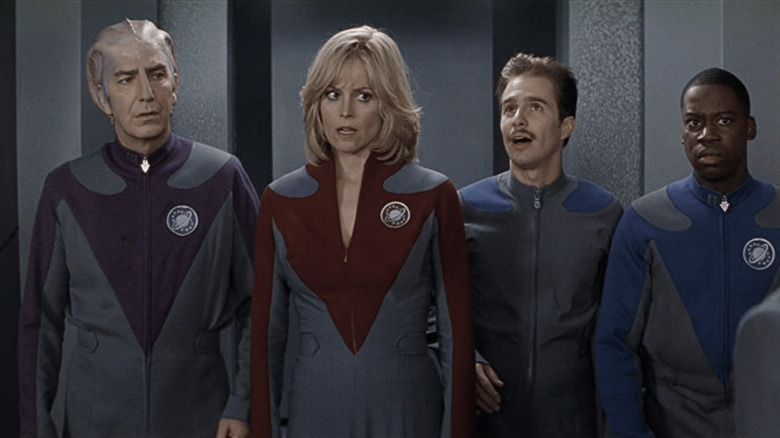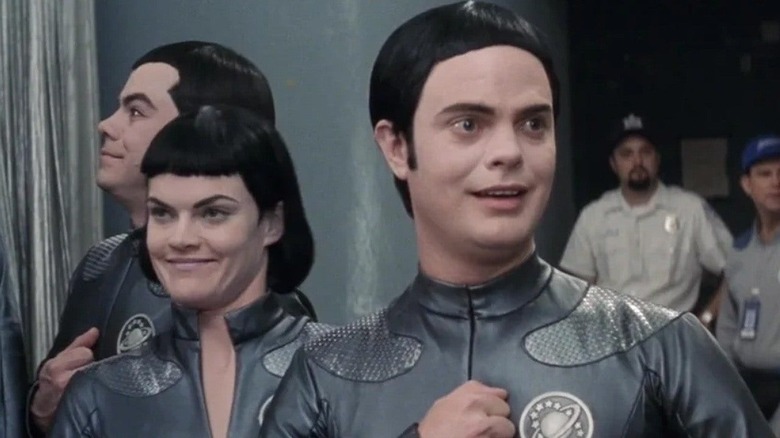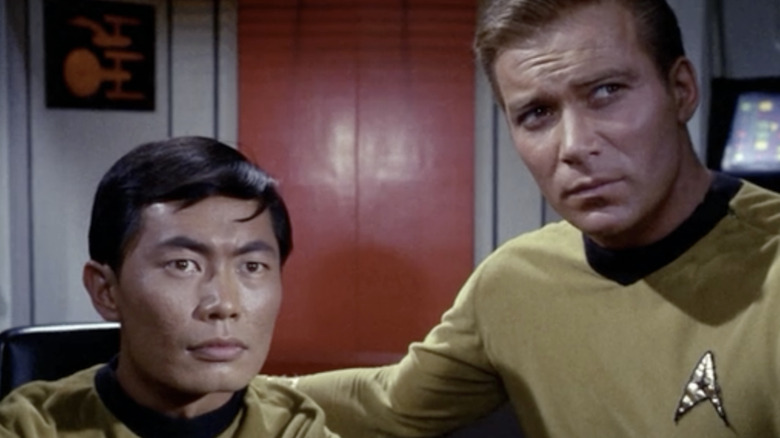Galaxy Quest's Director And Writer Knew Their Mission Was A Difficult One
What's the best "Star Trek" movie? Is it "The Wrath of Khan"? "The Voyage Home"? "First Contact"? Many a Trekkie have said, half or fully seriously, that the answer is the loving parody film, "Galaxy Quest." "High concept" doesn't even begin to cover the film: aliens (the Thermians) who believe that a short-lived sci-fi series was a documentary recruit the cast to help them battle a galactic tyrant.
The sci-fi show in question is a "Trek" parody, a program that was cut short but kept alive decades later by an obsessive fandom. Jason Nesmith (Tim Allen) is William Shatner, the egomaniac who soaks up public adoration so much he doesn't notice how his co-stars loathe him. Alexander Dane (Alan Rickman) isn't a one-to-one for Leonard Nimoy, but his resentment of playing the alien "Dr. Lazarus" is in line with Nimoy's autobiography, "I Am Not Spock" (his gradual acceptance of Lazarus mirrors the sequel, "I Am Spock"). Sigourney Weaver, a silver screen sci-fi icon in her own right, plays the series' female lead Gwen DeMarco/"Tawny Madison". Far from the hardened Ellen Ripley, Tawny was the show's eye-candy, and Gwen isn't too pleased about her legacy.
The lampooning doesn't end with the actors. "Galaxy Quest" cracks jokes about all the "Trek" hallmarks: technobabble, red shirts, and of course the fans who obsess over the "canon" of an imaginary world. According to writer Robert Gordon and director Dean Parisot, the challenge of the movie was striking the right balance of parody and sincerity.
Captain Starshine
MTV published an oral history of "Galaxy Quest" in 2014. The premise was there from the beginning, but the original script, by David Howard, was titled "Captain Starshine." Producer Mark Johnson liked the pitch but felt the script needed a touch-up, so he recruited Gordon.
Gordon didn't read "Captain Starshine" and worked only off a logline. He was reluctant to take the job, feeling, "[the story] could be a great idea or it could be a terrible idea. Gordon added some of the scene's funniest moments along the way, such as the crew scratching the ship when they take it out of drydock. However, he felt he only "got it" when he wrote the film's most emotional scene: where Nesmith and co. have to admit the truth to the Thermians.
Parisot agreed, saying: "The movie needed to begin as a mockery and end as a celebration. That's a hard thing to do. Part of the mission for me was to make a great 'Star Trek' episode."
The evolution is most apparent in Alexander's character development. His antipathy burns brightest for Lazarus' catchphrase, "By Grabthar's hammer, by the suns of Worvan, you shall be avenged." In the third act, to comfort the dying Thermian Quellek (Patrick Breen), Alexander recites the line in earnest. Then there's Jason's gambit to defeat Sarris, where he reverses time by 13 seconds to undo their loss. This could easily work as the ending to a real "Star Trek" movie and, indeed, is reminiscent of "Next Generation" episode "Cause and Effect."
Trek alumni's reactions
"Galaxy Quest" parodies both the fans of "Star Trek" and its makers, yet both parties loved the movie. Some "TOS" cast members gave tongue-in-cheek reactions. George Takei called the movie, "a chillingly realistic documentary." William Shatner said the picture was, "very funny," though joked, "I don't know what Tim Allen was doing. He seemed to be the head of a group of actors and for the life of me I was trying to understand who he was imitating."
It wasn't just actors from "The Original Series" either. Patrick Stewart, Captain Jean-Luc Picard himself, told the BBC how he initially didn't want to see the movie because he thought it was simply, "making fun of 'Star Trek.'" Who convinced Stewart to give it a chance? Jonathan Frakes, who played Commander William Riker and directed "Star Trek: First Contact," "Star Trek: Insurrection," and plenty "Star Trek" episodes. If any of the "Next Generation" cast could give a verdict on how to make a good "Star Trek" movie, it was Frakes. Stewart recalled seeing "Galaxy Quest" in a theater Saturday night:
"I found it was brilliant... No one laughed louder or longer in the cinema than I did, but the idea that the ship was saved and all of our heroes in that movie were saved simply by the fact that there were fans who did understand the scientific principles on which the ship worked was absolutely wonderful. And it was both funny and also touching in that it paid tribute to the dedication of these fans."
It's easy to make fun of something, but harder to do so from a place of love. The reactions from Trekkies and "Trek" alumni show that Gordon and Parisot pulled it off.


